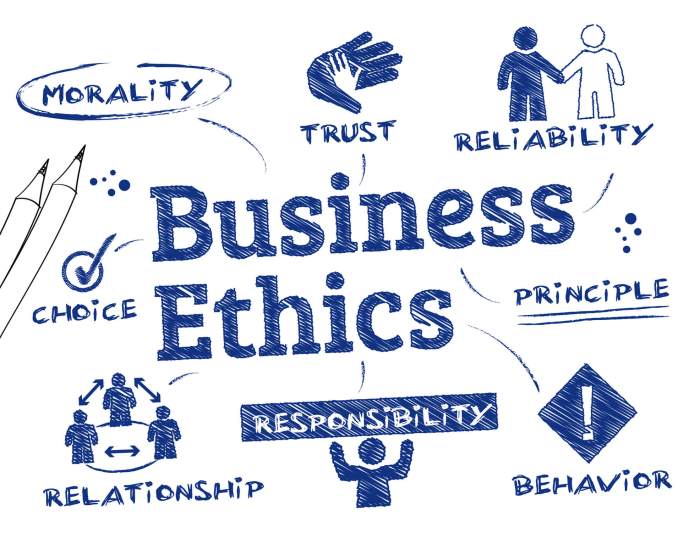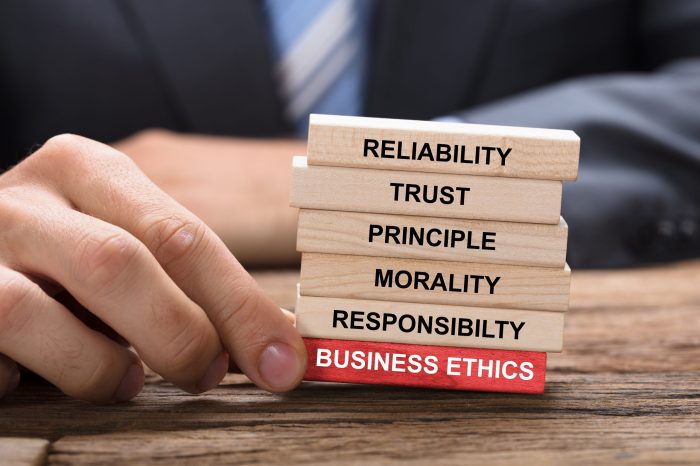Business ethics is like the cool kid on the block, setting the trend for ethical decision-making in the business world. From tackling dilemmas to exploring corporate responsibility, buckle up for a wild ride through the world of ethical business practices.
In this article, we’ll dive deep into the realm of business ethics, uncovering its importance, key decision-making processes, and the impact of ethical leadership on organizational culture. Get ready to explore the intersection of morality and profitability in the corporate landscape.
Introduction to Business Ethics
Business ethics refers to the moral principles and values that guide the behavior of individuals and organizations in the business world. It involves making decisions that are not only legal but also ethical and socially responsible.
The Importance of Business Ethics in Corporate Culture
- Establishes Trust: By operating ethically, businesses can build trust with their customers, employees, and other stakeholders.
- Enhances Reputation: Companies known for their ethical practices are more likely to attract and retain customers.
- Fosters Employee Engagement: When employees work for an ethical organization, they are more engaged and motivated.
- Reduces Legal Risks: Adhering to ethical standards can help prevent costly legal issues and damage to the company’s reputation.
Relationship Between Business Ethics and Profitability
- Long-Term Success: Ethical businesses tend to have higher levels of customer loyalty and retention, leading to long-term profitability.
- Attracts Investors: Investors are more likely to support companies with strong ethical values, leading to increased financial backing.
- Cost Savings: Ethical practices can lead to cost savings through improved efficiency and reduced risks of fines or lawsuits.
- Brand Loyalty: Consumers are more likely to support ethical brands, resulting in increased sales and market share.
Ethical Decision Making in Business

When it comes to making ethical decisions in a business setting, it is crucial to consider the impact of those decisions on various stakeholders and the overall reputation of the company. Ethical decision-making involves evaluating the potential consequences of a decision on stakeholders and society as a whole, and choosing the course of action that aligns with moral principles and values.
Examples of Ethical Dilemmas
- Employee treatment: Whether to prioritize profits over fair wages and working conditions for employees.
- Environmental impact: Deciding between cost-effective practices that harm the environment or sustainable alternatives.
- Product safety: Balancing the need to bring products to market quickly with ensuring they are safe for consumers.
Role of Stakeholders
Stakeholders play a significant role in influencing ethical decisions within a business. These are individuals or groups who have an interest in the company and can be affected by its actions. By considering the perspectives and concerns of stakeholders such as employees, customers, investors, and the community, businesses can make more informed and ethical decisions that benefit everyone involved.
Corporate Social Responsibility (CSR)

Corporate Social Responsibility (CSR) refers to a company’s commitment to operating in an ethical and sustainable manner, taking into account the social and environmental impact of its actions. It is a key aspect of business ethics as it involves making decisions that not only benefit the company financially but also contribute positively to society and the environment.
Significance of CSR in Business Ethics
- Enhances company reputation: By engaging in CSR initiatives, companies can build a positive reputation among customers, employees, and stakeholders.
- Attracts and retains talent: Employees today are more inclined to work for companies that are socially responsible, leading to better recruitment and retention rates.
- Improves customer loyalty: Consumers are more likely to support companies that demonstrate a commitment to social and environmental causes, leading to increased customer loyalty.
- Reduces risk: By addressing social and environmental issues proactively, companies can mitigate potential risks and avoid negative consequences in the long run.
Benefits of CSR Initiatives
- Positive impact on society: CSR initiatives can address social issues such as poverty, inequality, and environmental degradation, contributing to the overall well-being of communities.
- Competitive advantage: Companies that prioritize CSR can differentiate themselves from competitors and attract socially conscious consumers.
- Long-term sustainability: By integrating CSR into their business practices, companies can ensure long-term success by fostering trust and loyalty among stakeholders.
Examples of Successful CSR Programs
- Patagonia’s commitment to environmental sustainability through initiatives like the “Worn Wear” program, promoting reuse and repair of clothing to reduce waste.
- TOMS Shoes’ “One for One” model, where for every pair of shoes purchased, a pair is donated to a child in need, addressing social issues like poverty and access to education.
- Microsoft’s Affordable Access Initiative, which aims to provide affordable internet access to underserved communities around the world, bridging the digital divide.
Ethical Leadership: Business Ethics
Ethical leadership is a style of leading that upholds principles of integrity, honesty, fairness, and respect for others. It involves making decisions that are not only legally and financially sound but also morally right. Ethical leaders set a positive example for their employees and create a culture of trust and accountability within the organization.
Impact on Organizational Culture
Ethical leadership has a significant impact on organizational culture. When leaders prioritize ethical behavior, employees are more likely to feel valued, respected, and motivated. This, in turn, leads to higher levels of employee engagement, productivity, and satisfaction. A culture of ethics also helps to attract and retain top talent, as individuals are drawn to organizations with strong values and integrity.
Examples of Ethical Leaders
– Satya Nadella, CEO of Microsoft, has been praised for his focus on diversity and inclusion, as well as his commitment to ethical business practices.
– Mary Barra, CEO of General Motors, navigated the company through a major safety crisis with transparency and integrity, earning trust from both consumers and employees.
– Tim Cook, CEO of Apple, has been a vocal advocate for privacy rights and environmental sustainability, demonstrating a commitment to ethical leadership.
Promoting Ethical Leadership, Business ethics
- Provide ongoing ethics training for leaders at all levels of the organization.
- Encourage open communication and feedback channels to address ethical concerns proactively.
- Reward and recognize ethical behavior to reinforce the importance of integrity within the organization.
- Lead by example and hold leaders accountable for their actions, showing that ethical leadership is a top priority.
Ethical Challenges in Global Business
Global business operations often present unique ethical challenges that companies must navigate to maintain integrity and trust. These challenges can arise from differences in cultural norms, legal systems, and business practices across various countries. It is crucial for businesses to understand and address these challenges to uphold ethical standards and avoid reputational damage.
Cultural Differences Impact on Ethical Decision-Making
Cultural differences play a significant role in shaping ethical decision-making in international business. What may be considered ethical behavior in one culture could be perceived differently in another, leading to misunderstandings and conflicts. Companies operating globally must carefully consider cultural nuances and adapt their ethical frameworks accordingly to ensure compliance and respect for local values.
- Companies must be aware of cultural norms regarding bribery, gift-giving, and business relationships in different countries to avoid inadvertently engaging in unethical practices.
- Implementing comprehensive training programs for employees on cultural sensitivity and ethical decision-making can help mitigate the risks associated with cultural differences.
- Establishing clear guidelines and policies that reflect respect for diverse cultural perspectives can foster a more inclusive and ethical organizational culture.
Companies Facing Ethical Dilemmas in Global Operations
Several companies have faced ethical dilemmas in their global operations, highlighting the complex nature of doing business on a global scale. One prominent example is the case of Nike, which came under scrutiny for labor practices in its overseas factories. The company faced allegations of exploiting workers and violating labor rights, prompting a public backlash and calls for improved ethical standards.
- Nike took steps to address these concerns by implementing stricter oversight of its supply chain and collaborating with NGOs to improve working conditions for factory workers.
- The case of Enron is another notable example of ethical challenges in global business, as the company engaged in fraudulent accounting practices and misled investors, leading to its eventual collapse.
- By examining these cases and learning from past mistakes, companies can proactively identify and address ethical challenges in their global operations to uphold corporate responsibility and maintain stakeholder trust.